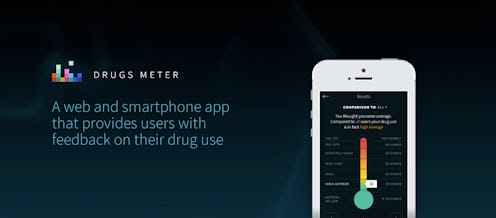News
A Drinking Buddy App That Won't Judge You

When it comes to education and prevention of alcohol and drug abuse, tired slogans like "Just Say No" and "DARE To Resist Drugs And Violence" are about as outdated as they are ineffective. Nobody wants to be preached to, and that's exactly why the new Drugs Meter and Drinks Meter apps are so perfect — they not only track your drug and alcohol habits, but also provide personalized, anonymous and most importantly, educational information that seems far more effective than any anti-drug or anti-drinking campaign I've ever seen.
Rather than berating you for a night of excessive drinking or smoking, the apps, created by the Global Drug Survey, simply compare your habits to those of those around you, both in the immediate vicinity and in your state and country. One of the key concepts of the app, explained Dr. Adam R. Winstock, the founder and director of GDS, in an interview with Vice, is "social, normative feedback."
That is to say, both the apps rely on data gathered on "tens of thousands of people around the world" to provide accurate and meaningful feedback to their users.
While we tend to surround ourselves with people who engage in similar activities and maintain similar habits, the Drugs Meter and Drinks Meter expands the social circle to include a much larger demographic.
So while "doing two grams of coke on Friday and Saturday" may be normal for one group of friends, the apps may make people realize that it's not "normal" behavior overall. Said Winstock, "Knowing what other people do can shift our behaviors in the right direction when it’s done smartly."
The goal of the GDS is to help recreational drug users and drinkers make smart, informed decisions about their habits. Currently, most of the efforts aimed at drug and alcohol education either target the very young and impressionable, or addicts who need to find a hard stop. But most drinkers and drug users, Winstock points out, are "people who...aren’t stupid, and... want to do it socially without intentionally harming themselves or people around them."
And because these users believe that their social habits aren't dangerous or worrisome, they tend to be the least informed about the extent to which they're being affected by their usage.
Enter the Drugs Meter and Drinks Meter, available both online and on your smartphone. The little apps give "people... an opportunity to reflect on how and what they do impacts on them personally, and how changing strategies will modify their own personal experience and risk of harm."
While most casual drug and alcohol users tend to feel invulnerable to the dangerous effects of the substances, GDS' apps remove this sense of invincibility and makes things more personal. They take "personal and family history, medication, and... personal pattern of drug use" into account, thereby creating an accurate snapshot of the effects drugs and alcohol have on an individual.
Here's how it works.
I tried the Drinks Meter, and was first asked to complete some basic demographic information.
The progressive app even takes a more modern stance on gender and sexuality preferences, which is great to see.
The next part was really cool — Drinks Meter immediately compared me to the rest of the app's database, breaking down the numbers by every possible classification. This instantly provided me with a point of comparison, though apparently, no one in the Dartmouth College area is using this awesome little tool.
I was then asked a series of questions about my drinking habits, including what I drank, how much I drank, and how often I drank.
You can easily adjust and add the number of drinks you had to properly reflect your normal drinking habits if your recent activity isn't indicative of those tendencies.
But then comes the coolest part — the analysis.
Caloric intake, monetary spend, just about everything I could possibly care about in terms of drinking was perfectly laid out for me. And while my one glass of wine didn't set off any warning bells, this format makes it easy to see how a heavier drinker might be alarmed. After all, if I'd been told that my weekly drinking habits were the equivalent of 15 or 20 cheeseburgers, I'd be concerned.
I was then given the opportunity to compare myself directly to the rest of the Drinks Meter user base, which as Winstock told Vice, certainly presents a sort of social pressure to do the right thing — or in this case, drink the "right" amount.
Luckily for me, my one glass of wine on a Saturday night qualifies me as a low-end drinker. But again, the availability of such a tangible meter by which to measure weekly intake is seriously cool, and I would imagine, seriously helpful in curbing unhealthy habits.
The app also allowed me to break down comparisons by age, gender, and location.
The concluding screen presented me with the recommended limits of alcohol consumption for women. Nowhere in the app, however, was there any sort of judgmental siren — no flashing red screen that might've popped up screaming, "YOU'RE AN ALCOHOLIC, GO SAVE YOURSELF NOW."
And it is precisely this non-judgmental attitude that Winstock believes makes GDS' apps so effective — they don't tell their users what to do, but simply provide them with all the necessary tools and information to properly analyze their behaviors and make smarter, more informed decisions.
There's no "stigma or shame," as Winstock puts it. And because all of GDS' services are "anonymous, independent and confidential," the apps ensure that users are comfortable staying safe or getting help if need be.
A pretty cool app for a difficult problem.
Images: Getty Images (3), http://www.drinksmeter.com/